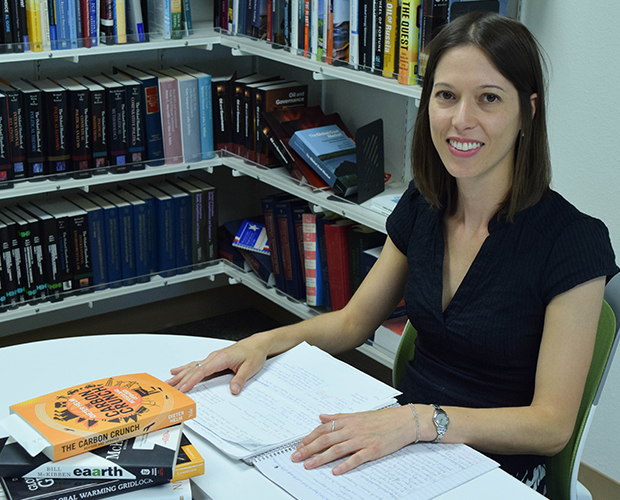Protecting the planet through fellowship

Sept. 14, 2016 | By Sarah Pfledderer | GPS News
Larissa Basso, a Ph.D. candidate at University of Brasilia, is visiting GPS on a Fulbright Fellowship to explore the politics of energy decarbonization under Professor David Victor
The Laboratory on International Law and Regulation (ILAR) at the UC San Diego School of Global Policy and Strategy (GPS) is welcoming a new researcher this academic year: Larissa Basso, a Ph.D. candidate in international relations at University of Brasilia.
Basso is visiting the lab on a Fulbright Fellowship, which she was competitively selected for as one of only two dozen doctoral candidates in Brazil to come to the U.S. in 2016.
With mentorship from ILAR Director and Professor David Victor, Basso will spend her nine-month appointment conducting research for and writing her dissertation on the politics of energy decarbonization in Brazil. This also may lend opportunities for her to engage in public talks at the School or as a guest lecturer in classes.
Noting climate change as an issue in dire need of global collaboration, Victor said Brazil is a pivotal player in this area for policymaking, given it is among the largest emerging economies in the world.
“How Brazil engages international partners is crucial to the well-being of the planet,” Victor underscored. “Larissa’s stay helps foster this much-needed engagement, opening future discussions and collaboration between scholars in Brazil and the U.S. My mentorship, and GPS in particular, offers her access to leaders on some of the most pressing issues facing the planet.”
For Basso, she’s most looking forward to tapping into the School’s political scientists exploring climate change and decarbonization—that is, people like Victor, who is a part of the leadership for UC San Diego’s Deep Decarbonization Initiative, launching this fall.
“In Brazil, there are a lot of people studying energy decarbonization especially in economics and engineering,” Basso explained. “I'm addressing the political dimension, which has been less studied in Brazil. This is what interests me most, and I’m positioned perfectly to explore this more in California, where the topic is in great evidence and there are many state initiatives regarding energy.”
Specifically, Basso is charting transformations in Brazilian political views on energy from the start of Brazil’s participation in the International Climate Change Regime through 2015, observing how different interests have been influencing energy policymaking and which political actors in Brazil are for and against energy decarbonization and why.
Basso said she hopes to be introduced to new methodologies to apply to her research while at GPS, as well as learn new viewpoints on the topic from academics studying it here.
“I hope to return to Brazil with new skills and perspectives to contribute to this conversation,” she said. “That’s the point of Fulbright, after all.”
Victor concluded with an even more optimistic outlook on Basso’s fellowship, bearing in mind the big-picture benefits.
“This engagement can assist with achieving the overall goal of protecting the planet,” he said.

